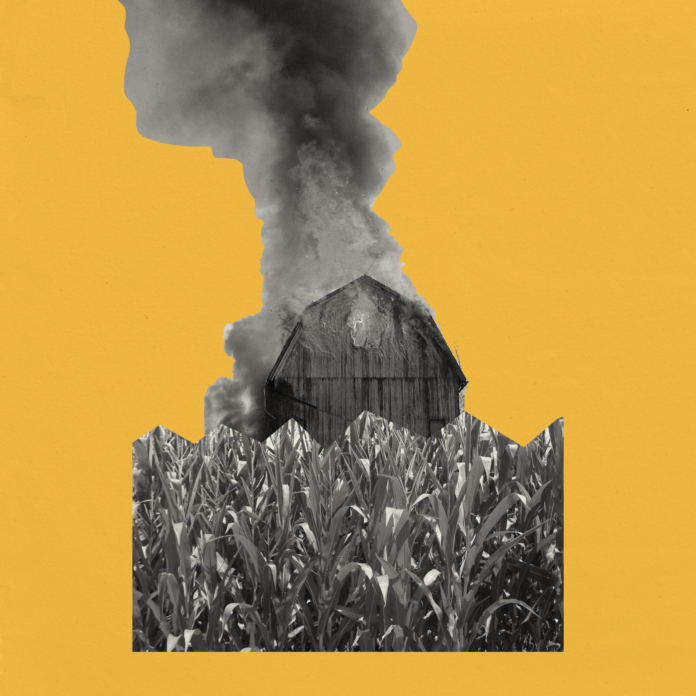My mother sets fire to the family sofa when she’s three years old. Woodrow Wilson is President and Marcus Garvey is selling tickets back to Africa. Her father has warned her about playing by the fireplace in their Pittsburgh row house but there she is again with her doll baby. The doll’s hair catches fire by accident or is part of an experiment. When it becomes a torch Mama tosses it under the sofa.
Her father’s mad but he gets over it. They put it out before the whole room goes up and there’s the bright side that they made it out okay. All seven of them and little fire-starter.
Two years later her father is electrocuted by low hanging wires in a West Virginia coal mine. One morning he leaves as usual swinging his tin lunch pail and jumps on the shift truck but never comes back. Well. Comes back in a box that sits in the parlor. Inside he looks unlike himself: coal black, eyes drawn, lips pursed. Not even when she set the sofa ablaze was he this cross. So she sits in a chair by him or leans into the box trying old tricks to tickle his insides. She reads comics from the paper sounding out words. Nothing. Next day their North Side neighbors, dreamers from as far away as Lithuania and as close as the Carolinas, transform the narrow city streets into an impromptu homegoing. The ebb and flow of dusty men out of mines and steel mills stop to salute. Women in limp house dresses crowd modest porches crossing themselves. Folks going and coming from day work and factories shoo children off the street to make way. Black men, Freemasons, step in double file wearing dark suits and white plumed hats. They step past the house on Decatur Street. The milkman pauses his horse-drawn truck to wave. She feels excited and sad in her new dress and hair ribbon. She waves back from behind the hearse.
Joseph Cain’s body goes back to his people in Houston to lay in a family graveyard that fire-girl will seek all life long but never find.
The march of loss is a solemn footfall through the house on Decatur Street. The encyclopedia man comes to repossess the world from A to Z. Her mother’s belly grows. The piano man is next, apologetic and distributes sheet music like manna among the children as burly men angle the piano out the door. Newborn baby sister cries and cries and gives voice to a wounded house.
People from the neighborhood help. At the screen door some struggle with English words of encouragement but food translates: goulash, kugel, stuffed cabbage, ham hocks, cornbread, backyard tomatoes and Florida oranges. The government issues whole chickens in cans but the coal mine gives up not one sooty cent.
Family from Texas and Ohio come. Aunts and uncles want to pick a child to raise. Take this one or that or the baby, for instance. They say, it’s a future foretold. Odelia. You’re a widow with nothing but lint in your pockets. You even got a penny among you? But her mother refuses. Says they’ll remain together, all seven of their hungry souls. And the spirit of my granddaddy.
Now my mother is ten and lean. One pair of butt-flap longjohn’s and you try to find enough woolen socks against those Seven Coat Joe winters. She picks coal nuggets off the streets for their furnace. And everybody pulls. Her brothers hawk the Pittsburgh Courier before school. Her sister quits high school for the laundry downtown. Another brother tries to sell Prohibition moonshine but her mother makes him take the tinkling wagon of drink back to the bootlegger.
Then the Great Depression settles on them like the black snow of coal country heavy on the backyard Sycamore. Flame girl turns from the winter window to the sparse supper table upon which her mother asks for blessings. They know years of misfortune bowing their spirit and of the Black blood of revival.
My mother graduates from Oliver High School with honors, like her brothers. It’s 1934. One by one they seek their fortunes in New York City but Pittsburgh is where they were made: North Side, Decatur Street.
Kathryn Cain Sills is eighty-four and the last of the Pittsburgh crew. In her lifetime she’s used her flame as sometimes torch, burning through color lines of typing pools and secretarial offices; sometimes a beacon of our blood past. She has a new role now as widow after fifty-nine years of marriage and no interest in living alone. She circulates among her children spreading past to present, writing stories and journals.. When she lives with me and my son she roams the town’s library, takes up painting, and retells stories about growing up. The steel in her constitution.
On the day I give her my new cell number, she holds the slip of paper in her long fingers, smiling. When she looks up at me, her dark eyes spark behind big glasses and the flamethrower speaks: You know those last four numbers are the same as my address on Decatur Street.
(This essay is based on the stories and journals of the author’s late mother, Kathryn Sills.)

